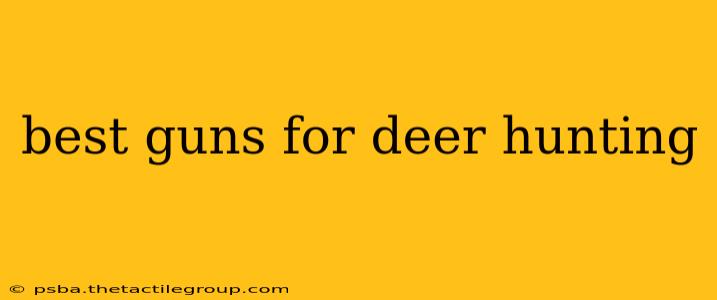Deer hunting requires precision, power, and reliability. Choosing the right firearm is paramount for a successful and ethical hunt. This guide explores the best guns for deer hunting, considering various factors like caliber, action type, and hunting style. We'll delve into the pros and cons of different options to help you make an informed decision.
Understanding Your Hunting Style and Terrain
Before diving into specific firearm recommendations, consider these crucial factors:
-
Hunting Style: Are you a spot-and-stalk hunter navigating dense woods, or are you hunting from a stand or blind? Different hunting styles demand different firearm characteristics. A lightweight, maneuverable rifle is ideal for traversing challenging terrain, while a heavier, more stable rifle might be preferred for long-range shots from a blind.
-
Terrain: Open fields require different considerations than thick forests. Shot distances vary significantly depending on the terrain. Open areas might allow for longer shots, while dense woods necessitate shorter-range accuracy.
-
Shot Distance: Realistically assess the typical shot distances you'll encounter. A short-range shot requires less power than a long-range shot.
Top Gun Choices for Deer Hunting
Here's a breakdown of some of the best firearms commonly used for deer hunting, categorized by action type:
Bolt-Action Rifles: Precision and Power
Bolt-action rifles are renowned for their accuracy and reliability, making them a popular choice among deer hunters. They offer smooth, controlled actions and are generally known for their longevity.
-
.30-06 Springfield: A classic deer hunting cartridge known for its versatility, power, and relatively mild recoil. Suitable for a wide range of distances and deer sizes.
-
.308 Winchester: A slightly smaller cartridge than the .30-06, offering less recoil and excellent accuracy. A great choice for hunters who prefer a lighter-recoiling rifle, especially for longer hunting trips.
-
6.5 Creedmoor: A newer cartridge gaining immense popularity. Known for its exceptional accuracy, flat trajectory, and reduced recoil compared to larger calibers. Ideal for longer-range shots.
Pros of Bolt-Action Rifles:
- Accuracy: Generally known for their superior accuracy.
- Reliability: Durable and dependable, even in challenging conditions.
- Versatility: Available in a wide range of calibers to suit different needs.
Cons of Bolt-Action Rifles:
- Slower follow-up shots: Compared to semi-automatic rifles, bolt-action rifles require more time to reload.
- Steeper learning curve: May require more practice to master the bolt action.
Semi-Automatic Rifles: Faster Follow-up Shots
Semi-automatic rifles offer the advantage of faster follow-up shots, useful in situations where multiple shots might be necessary. However, they often come with a higher price tag and more recoil than bolt-action rifles.
-
.308 Winchester (Semi-Auto): The same powerful cartridge as its bolt-action counterpart, but with the added benefit of semi-automatic functionality.
-
.30-30 Winchester (Lever-Action): While technically a lever-action, the .30-30 is a popular semi-automatic choice for hunters preferring a more traditional feel. It offers good stopping power at shorter ranges.
Pros of Semi-Automatic Rifles:
- Faster follow-up shots: Advantageous when multiple shots may be needed.
- Reduced fatigue: The quick follow-up shots minimize fatigue during long hunts.
Cons of Semi-Automatic Rifles:
- Higher recoil: Generally experiences higher recoil than bolt-action rifles.
- Higher cost: Typically more expensive than comparable bolt-action rifles.
Muzzleloaders: A Traditional Approach
Muzzleloaders offer a unique hunting experience and are often subject to specific regulations. They require more preparation and maintenance, but provide a rewarding and challenging hunt.
Pros of Muzzleloaders:
- Traditional Hunting Experience: Offers a distinct hunting experience appreciated by many.
Cons of Muzzleloaders:
- More Preparation: Requires more preparation and cleaning between shots.
- Slower Reload Time: Significantly slower reload time compared to other firearm types.
Choosing the Right Caliber
Caliber selection is crucial and depends on factors like the size of the deer you're hunting, the distance you'll be shooting, and personal preference. Larger calibers generally deliver more stopping power but with greater recoil, while smaller calibers are often easier to shoot accurately but may require more precise shot placement.
Conclusion: Finding the Perfect Fit
Selecting the best gun for deer hunting is a personal decision based on individual needs, hunting style, and preferences. Consider the factors discussed above—hunting style, terrain, shot distance, and caliber—to choose a firearm that best suits your hunting strategy and ethical hunting practices. Remember to prioritize safety and always practice responsible firearm handling.

